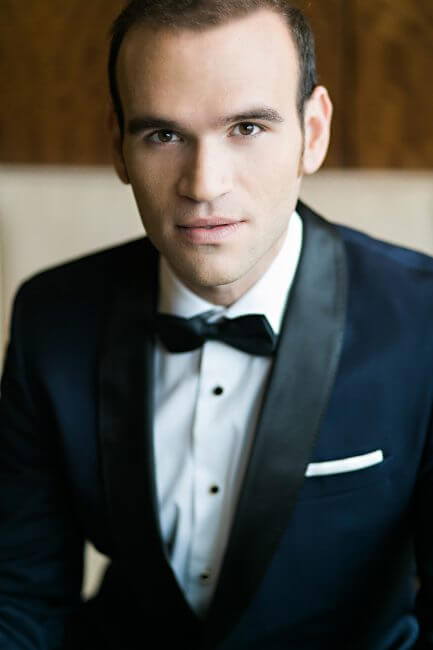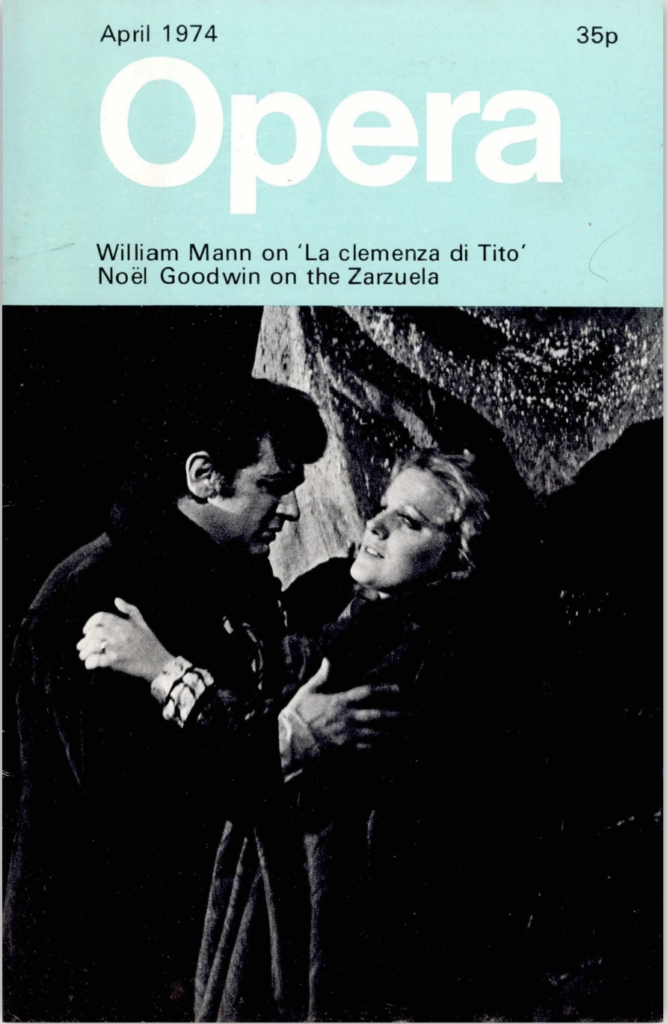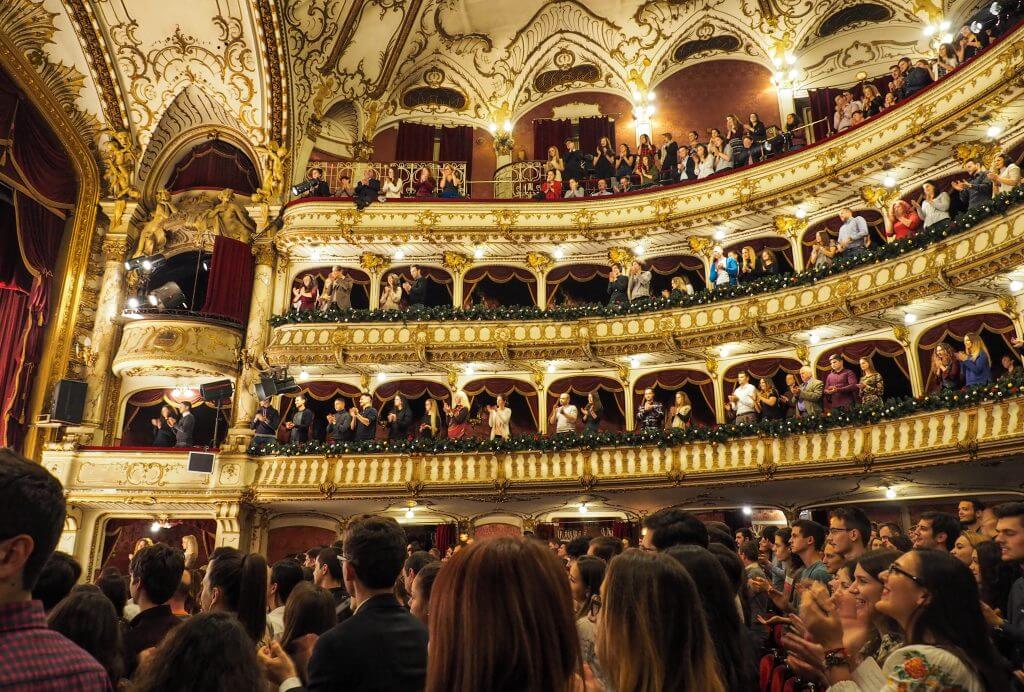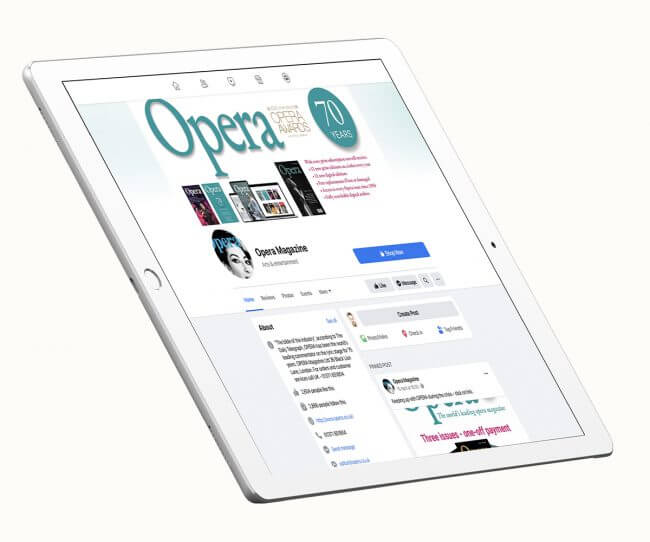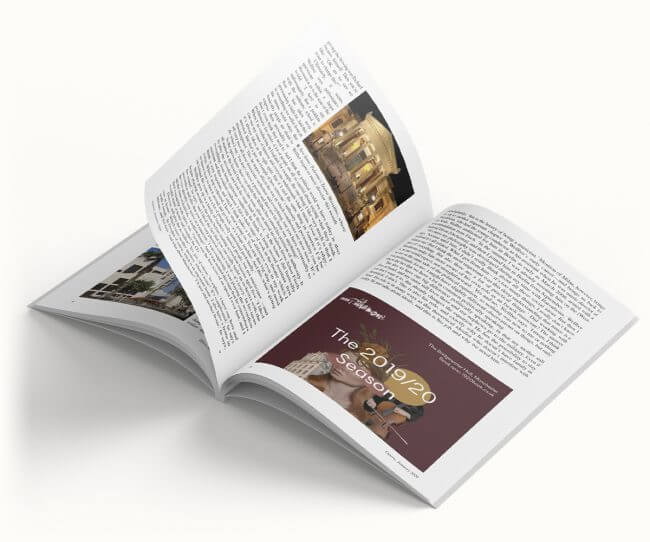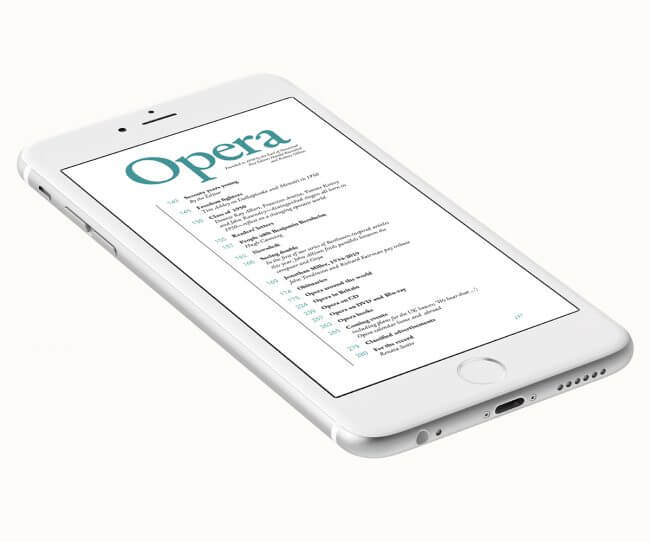Michael Fabiano
May 2015 in People
Fabiano sings the title role in Glyndebourne’s ‘Poliuto’ this month (from May 2015)
By Deborah Jones
Michael Fabiano and I sit in the conductor\’s dressing room at the Sydney Opera House, its wide windows giving a fine view of the harbour. It\’s getting towards late afternoon but Fabiano hasn\’t been up for long. He had sung the title role in Faust for Opera Australia the night before but that wasn\’t the reason for his lie-in. Half a world away from his next engagement-two late-March performances of Faust with the Paris Opéra-and with less than a week before his departure, Fabiano is resetting his body-clock. The American tenor is becoming increasingly well acquainted with international airports and time zones as his career moves into overdrive. After Paris he goes directly to Glyndebourne to sing the title role in Donizetti\’s Poliuto, following last year\’s house debut in La traviata; in September he sings his first Rodolfo in Luisa Miller for San Francisco Opera. It\’s back to Paris next year for the Duke in Rigoletto and then, hard on the heels of each other, two more debuts: the title role in Don Carlos in San Francisco (June) and Jacopo Foscari at Madrid\’s Teatro Real (July). Also in the mix is his Covent Garden debut as Lensky in next season\’s revival of Yevgeny Onegin-another first. And these are just the things he can talk about, although he is not above dropping hints. ‘I\’m going to be singing in Zurich next year but they haven\’t announced their season yet so I can\’t say anything.\’
The rush of new roles means that Fabiano, like the top tennis players, has his coach, Laurent Philippe, by his side most of the time. And not just for roles that are in the schedule. ‘I think the process of study and learning and exploration is integral to good artistry. There are many roles in the repertory that I love and that I go through. I study the structure of the libretto, I study the arc of the music, and then I vocalize it, and then I put them together. They may not be roles I will touch for years on the public stage but there are things that I have begun studying that I will definitely sing some day.\’ He won\’t be drawn on Otello, but one would be mad to count it out.
Fabiano, therefore, is ready for whatever the next 15 months and beyond will bring. More than ready. ‘I believe in planning ahead. I believe in a pattern and a process,\’ says the tenor, whose debut in the title role of the rarely performed Poliuto-this will be its first UK staging-opens the Glyndebourne Festival on May 21, two weeks after his 31st birthday. ‘The career trajectory started hot and heavy two and a half years ago, and Glyndebourne had asked a bit before that. Asking a young singer to sign up for Poliuto is a tall order but I knew the work well enough.\’ In fact, Poliuto had been on Fabiano\’s radar since he was a student at the University of Michigan, already delving into repertoire that interested him. When he says he\’s a planner he\’s not kidding.
‘I\’ve performed maybe 18 roles but I would say there are another ten that I have worked very hard on, that are prepared and ready for when the moment is right. Roberto Devereux I learned when I was 20, 21. I know it inside out but I\’ve yet to do it. If someone offered me La favorita tomorrow I\’m ready, because I\’ve studied it in depth. I look forward to singing the majority of the Verdi roles in the next ten years and I hope to be able to do Un ballo in maschera before too long. That\’s one I have to say is not programmed-and it\’s the one that I\’m looking forward to getting programmed. The calendar is basically filling up fast, so let\’s go!\’ Fabiano\’s eyes light up and he snaps his fingers.
‘Let\’s go!\’ pretty much describes Fabiano. He\’s worked methodically and intensely hard to get to this point but it\’s only the start of what he wants to achieve in the art form he so ardently loves. With his closely cropped hair, taut physique (he\’s a runner, 35kg lighter than he was at 20) and fiercely argued opinions, Fabiano brings to mind an evangelical preacher, and it would not be going too far to say that for him, opera is a calling. ‘I am a shepherd of music. That\’s my duty. I don\’t do this for me-I do this for the public. When the public is happy, I\’m happy.\’
So far the public approves, as do critics and opera managements. ‘The prototype for the 21st-century opera singer\’ is how Opera Australia\’s artistic director Lyndon Terracini encapsulates Fabiano\’s triple whammy of big lyric voice, good looks and persuasive acting. As Hugh Canning wrote in The Sunday Times in January this year: ‘The potential here is huge: he\’s a handsome man with the vocal chops to become the most significant American tenor since Richard Tucker.\’ To the list of 21st-century qualities you can also add a keen knowledge of business practice, social media and the ways in which technology can be used to attract young people to a form that, as far as Fabiano is concerned, does not need to change one iota. In his view, despite the precarious state of many companies, opera itself is not broken; it just needs much smarter marketing, using the language young people understand. And he\’s not talking about hooking up with pop singers because that might appear cool. ‘No, we\’re really cool. Opera is cool.\’
On this subject Fabiano can and does talk for hours. ‘We don\’t have to change the art form. I don\’t want to dilute opera or classical music at all-make sure you say that! There can never be a dilution of the form. We need to make a business-positive case for opera. I\’m interested in demystifying the form and making people understand that it\’s music for all.\’ Heavily discounted tickets for young people are obviously part of this, and Fabiano is encouraged by the work many opera houses are doing in this regard. As part of the demystification process he talks to students via Skype and Google Hangouts (an instant messaging and video-conferencing service) and hopes to expand this work.
Fabiano was born in Montclair, New Jersey in 1984 to an Italian-American family that valued hard work and success. They were deeply engaged with music and remain so. Fabiano\’s parents have now moved to Florida so that\’s where he considers home to be, although he says he lives the life of a vagabond. Fabiano\’s father, Anthony, is chair of the fledgling company Gulfshore Opera\’s board and his son has signed on as an adviser. ‘It\’s a company that spans a very large area, with a large population of Haitian and Latino Americans. There\’s potential to attract a lot of new adopters to the form through low-cost initiatives. If we can introduce opera to new audiences even on a regional level it serves the public at large.\’ Singing was a big part of Fabiano\’s early life but so were debating, tennis, baseball umpiring, and being ‘a car freak\’, which he still is. He has a brand new BMW M3 which, I am reliably informed, says much about Fabiano. It is extremely high quality, a six-speed manual and super-fast but without the superficial flashiness of more obvious marques.
His operatic path started at the University of Michigan, which he entered at the age of 18. ‘I went to the school to study economics, accounting, you name it. I applied to their music school because I knew I had a talent and that was a way into the school. My intention was never to go the distance musically.\’ His teachers persuaded him otherwise. One of them, George Shirley, the first African American tenor to sing at the Met, remains a greatly valued mentor and adviser. Fabiano has also stayed close to Julia Faulkner, an early influence and now the director of vocal studies at Chicago Lyric Opera\’s Ryan Opera Center. He works on technique with her when he can, and also with tenor Neil Shicoff. On the road, Laurent Philippe works with Fabiano not only on new repertoire but as his eyes and ears in new theatres. ‘I always go back to the fact that as much as there\’s an art in this, there\’s also a science and a business behind it. The business case for singing is that people want to hear the voice delivered in the best way possible. If I don\’t have ears I can trust, I don\’t know always if I can do that.\’
After Michigan Fabiano went to Philadelphia\’s Academy of Vocal Arts and was singing professionally before his graduation in 2009, although not for him were years of toil in the chorus or an apprenticeship at a provincial German house. A New Jersey Opera Theater production of L\’elisir d\’amore in 2006 prompted Rupert Baxter to write in opera that Fabiano as Nemorino ‘commanded the stage with his sure sense of comedy, and sang with a winning blend of sensitivity and vocal power\’. A couple of months earlier David Shengold had heard Fabiano\’s Dom Antonio in Donizetti\’s last opera, Dom Sébastien, at Carnegie Hall and noted his ‘excellent lyric tenor material\’.
Fabiano\’s win at the 2007 Metropolitan Opera National Council Auditions was a big breakthrough. A documentary of the process, The Audition, showed him to be exceptionally competitive and I was told he doesn\’t like to talk about that much these days. Well, he was only 22 at the time. As it turns out he is quite happy to broach the general topic. ‘This notion that the arts are not competitive is idiotic. Of course the arts are competitive and I\’m proud of that-it\’s not like it\’s a negative thing. Many great singers can co-exist. There is healthy competition and I believe in a healthy fight. I believe in meritocracy.\’
Last year he was chosen for both the Richard Tucker Award and the Met\’s Beverly Sills Artist Award, the only singer to have received them (and the combined $100,000 attached) in the same year. More importantly, he is getting his pick of roles. The Duke (his English National Opera debut role in 2009) and Puccini\’s Rodolfo are still very much on the agenda-there\’s a reported booking for a new Richard Jones production of La Bohème at Covent Garden in 2017-but Fabiano\’s meticulous plans involve a great deal more than the frequent rotation of three or four popular operas. He is entering the phase of his career when not only are coveted major roles coming his way (Don Carlos is particularly close to his heart), but he might also expect operas from less-frequented corners of the repertoire to be staged for him. He smiles. ‘It\’s not a hope. It\’s going to happen. Poliuto\’s a great start, isn\’t it?\’ And others would be …? Fabiano laughs delightedly. ‘You think you\’re going to bait me into giving you answers …\’
But he does throw out a few ideas. ‘Manon, Werther, Ernani, a few of the early verismo operas. Boccanegra. If Oberto came up, I\’d try it. If Jérusalem happened,I would do it. Attila. All those are interesting to me.\’ I ask if these are already in his calendar, knowing he\’s booked up for more than five years. ‘Most are in my calendar.\’ I understand Werther is a potential Opera Australia engagement, and Fabiano also mentions Carmen with interest.
Donizetti and Verdi call to him most powerfully. ‘One of the first things I did when I went to the library at the University of Michigan, was to go to the stacks and I found-here he races through the names-Anna Bolena, Maria Stuarda, Roberto Devereux, La Favorite, Poliuto and I looked at all of them and studied them. And then others, like Maria di Rohan, I would look through and try to find the parallels and the big differences. I always had a big thing for Roberto Devereux and Favorite and Poliuto-they\’ve always intrigued me. You definitely see how Verdi drew on the operas that came right before him.\’
Rossini doesn\’t interest Fabiano at all and Bellini not much. ‘For me Donizetti had a really good knack for developing music of seriousness. When I listen to the three composers, Donizetti gives the greatest link to Verdi. For me it\’s a combination of orchestral layering with the vocals, the use of horns and brass in particular. I find his work to have a bit more of a rock in the sound, in the orchestration and presentation, than I do in Bellini or Rossini.\’ I read him a sliver of Julian Budden\’s description, in Grove, of Donizetti: ‘The Donizettian tenor has a character of his own. A poet of the voice … he excels in the portrayal of innocence betrayed. In his mature operas Donizetti\’s touch never failed with the tenor, yet his means were of the simplest … no composer was more adept at distilling sadness from the combination of tenor voice and plain major-key harmonies.\’ Fabiano agrees enthusiastically. ‘That\’s true-I agree with that!\’
Apart from La Bohème (‘so spectacular, just wonderful for the public\’), Puccini doesn\’t figure prominently. Fabiano has sung Pinkerton a few times and the role simply doesn\’t appeal. Perhaps, later, there might be a Fanciulla del West or Manon Lescaut. ‘Those are the ones I love.\’ Then there\’s Il tabarro. ‘Way down the line,\’ he says with great emphasis.
Poliuto was written in 1838 for Naples but banned because of its religious theme of conversion and martyrdom. It wasn\’t performed there until 1848, after Donizetti\’s death, although it was seen in a heavily refashioned version in Paris as Les Martyrs. Glyndebourne is going back to the beginning, says Fabiano. ‘I\’m very excited to sing at Glyndebourne again because it produces extremely high quality and focused work.\’ Fabiano is a practising Catholic so it seemed reasonable to ask if Poliuto had extra resonance for him, given its subject matter. Not exactly, he says. He appreciates the element of faith but wouldn\’t choose to perform Poliuto or any other opera for that reason. For him it is vital that a work and its performers connect powerfully with a wide audience. He believes strongly that opera should be for the many and not the few, and that the many respond to music with, essentially, tunes they can hum. He is not against modern productions, nor indeed new operas, as long as they are ‘relevant and approachable\’. He names the Americans Jake Heggie and Kevin Puts along with the UK\’s Iain Bell as composers whose work he admires. ‘If the right opera came from a composer that\’s of today, I would be more than game. They are part of the solution of keeping this art form moving forward.\’
When we first met I mentioned the tumult from the audience that one can hear on the 1960 live La Scala recording of Poliuto, in which Maria Callas sings Paolina, with Franco Corelli in the title role. Fabiano is convinced it is possible to rekindle that kind of passion for opera. ‘What compels me the most is when I experience something that\’s absolutely real. Real theatre, real music, unamplified, unaltered. It\’s never going to be perfect. No singer will ever give you perfection from top to bottom, although some will come really close-some have definitely come close. But I think there\’s more excitement when we know that a singer might go to the edge. Can they make it? It\’s like watching a soccer match and someone going for a goal. Will it get in? Same thing. There has to be some danger. That for me is the best.\’



